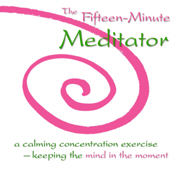Q. Is FMM compatible with other practices i.e., psychotherapy, yoga, relaxation exercises?
A. Yes, FMM can be integrated into any other psychological health practice. Hatha Yoga and relaxation exercises specifically attend to the physical tensions, while FMM goes a step further to release unconscious motivating patterns to be viewed and resolved by the discriminating conscious mind.
Q. Can FMM assist in helping to overcome psychological and emotional problems?
A. Yes, FMM can help solve problems, because when we practice stillness, we are developing the mental stamina to directly face the issues that continuously present themselves to us for resolution. Thereafter a healthy and spontaneous intuition meets the demands of challenging circumstances.

Q. Will FMM help me eliminate my anger?
A. Anger is a conditioned response to stress. With a deeper understanding of the value and meaning of patience, we can gradually move toward constructive means of handling life's perpetual conflicts.
Q. Will FMM help me cope with fear?
A. Fear is an emotion stimulated by either an apparent or imagined stress. Anxieties diminish in time, with the daily practice of the principle of non-emotional response.
Q. Will FMM improve my work performance?
A. Yes, meditation helps develop mental concentration and personal creativity, which enhances the skills required for any immediate task, whether on the job or in the home.
Q. Will FMM help me develop more patience and tolerance toward my co-workers?
A. Many individuals bring their personal shortcomings to the office or work place. FMM explains that daily stressful circumstances act as a catalyst to draw out the potentials for patience and compassion toward others in and away from the work environment.
Q. Does FMM require one to adhere to a particular religious belief?
A. No, FMM is in itself doctrine-free. But because it is based upon universal principles, it is compatible with most religious and spiritual practices.
Q. Is it like hypnosis?
A. No, on the contrary. FMM does not place one in an hypnotic state, rather it encourages us to focus on our own self-stimulating conscious awareness.
Q. Will meditation be OK with my doctor?
A. An increasing number of informed doctors today recognize the benefits of meditation and its capacity to reduce stress and anxiety.
Q. Will FMM help my heart condition?
A. FMM is not a cure for heart conditions per se. Studies have shown, however, that meditation reduces stress on the physical metabolism, which in turn can greatly benefit those with heart problems.
Q. Does FMM provide benefits for peri-menopausal and menopausal women?
A. Yes, FMM's calming effects help women of all ages come to terms with nature's constant hormonal fluctuations.
Q. Can FMM assist victimized individuals in diminishing the ongoing threat of physical, emotional and psychological abuse?
A. FMM offers the principle of non-reactive preparedness, which is key to disarming and neutralizing the aggressive and demeaning intent of an abuser.
Q. Will meditation help me with my children?
A. Children deserve a calm and patient response to their needs. FMM focuses on the practice of non-emotional response, enabling us to find the patience and insight we need to help guide our children.
Q. How did the technique of FMM develop?
A. FMM is a result of years of experimentation and synthesis, drawing on the best of ancient and modern forms of meditation and concentration exercises. While concentrating only on the essentials, there is no danger of being distracted by unnecessary dogmas. In this way, the special qualities of FMM will bring one forward to a more direct path toward psychological and emotional well-being.
to support more ongoing features and information.

Contact Us | For Wholeness Practitioners
Copyright © 2002 by Sarah Kalvin
All Rights Reserved
